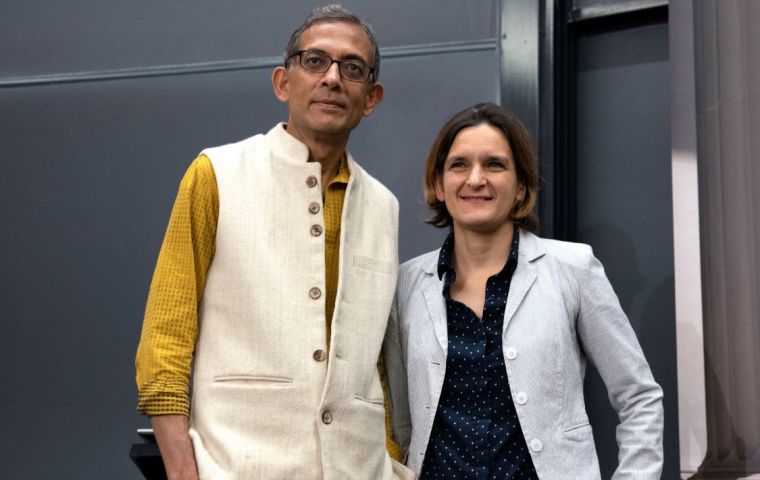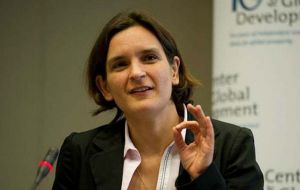MercoPress. South Atlantic News Agency
Nobel Economics Prize for work in fighting global poverty by three US-based economists
 Academy said their work had shown how poverty could be addressed by breaking it down into smaller, more precise questions in areas as education and healthcare
Academy said their work had shown how poverty could be addressed by breaking it down into smaller, more precise questions in areas as education and healthcare  French-American Duflo becomes only the second female economics winner in the prize's 50-year history, as well as the youngest at 46
French-American Duflo becomes only the second female economics winner in the prize's 50-year history, as well as the youngest at 46 US-based economists Abhijit Banerjee, Esther Duflo from MIT, and Michael Kremer. Harvard University, won the 2019 Nobel Economics Prize on Monday for work in fighting global poverty that has helped millions of children by favoring practical steps over theory.
French-American Duflo becomes only the second female economics winner in the prize's 50-year history, as well as the youngest at 46. She shared the award equally with Indian-born American Banerjee and Kremer, also of the United States.
The Royal Swedish Academy of Sciences said their work had shown how poverty could be addressed by breaking it down into smaller and more precise questions in areas such as education and healthcare, making problems easier to solve.
It said the results of their studies and field experiments had ranged from helping millions of Indian schoolchildren with remedial tutoring to encouraging governments around the world to increase funding for preventative medicine.
”It starts from the idea that the poor are often reduced to caricatures and even the people that try to help them do not actually understand what are the deep roots of (their) problems,“ Duflo, speaking by telephone, told a news conference in Stockholm.
”What we try to do in our approach is to say, 'look, let's try to unpack the problems one-by-one and address them as rigorously and scientifically as possible',“ she added.
For example, their field experiments that found that while providing more textbooks and free school meals had only small effects, targeted help for weak students made a significant difference to overall educational levels.
Another study gathered evidence on how an often overlooked measure such as de-worming children could help their education. Yet another found that making the renewal of teacher contracts dependent on pupil grades produced better scores, while reducing the pupil-teacher ratio had little impact.
Citing Banerjee's methods as having transformed classroom teaching in state schools in New Delhi, the Indian capital's chief minister Arvind Kejriwal said on Twitter that it was a ”big day
for every Indian“.
The team have notably been associated with the ”Teaching at the right level” (TarL) program which has helped 60 million children in India and Africa and focuses on math and reading skills for primary school pupils.
Duflo said the importance of the two most commonly cited approaches to tackling poverty - foreign aid and freeing up trade with poor countries - had often been “overstated”.
While the United Nations estimates that global poverty has been cut by more than half since 2000, it says one in ten people in developing regions still live on less than US$1.90 a day. In sub-Saharan Africa, that proportion rises to 42 per cent.
Asked whether Duflo's award was an attempt to redress the gender imbalance in the prize's history, Peter Fredriksson, chairman of the Nobel Committee for Economic Sciences, said it showed that women were now more present in economics.
Duflo remarked that it came at an “extremely important and opportune time” for women in a sector that has traditionally been very male-dominated.
”We are at a time when we are starting to realize in the profession that the way that we (treat) each other privately and publicly is not conducive all the time for a very good environment for women,” she said.
The 9 million Swedish crown (US$915,300) economics prize is a later addition to the five awards created in the will of industrialist and dynamite inventor Alfred Nobel, established by the Swedish central bank and first awarded in 1969.
Economics is the last of the awards to be announced with the winners for medicine, physics, chemistry, literature and peace having been unveiled over the course of last week.
The 2018 Nobel Economics Prize was jointly awarded to US economists William Nordhaus and Paul Romer, pioneers in adapting the western economic growth model to focus on environmental issues and sharing the benefits of technology.
Nordhaus' recognition has proved controversial, with critics arguing the model he created to describe the interplay between the economy and the climate seriously underestimated climate change-related risks.




Top Comments
Disclaimer & comment rulesCommenting for this story is now closed.
If you have a Facebook account, become a fan and comment on our Facebook Page!